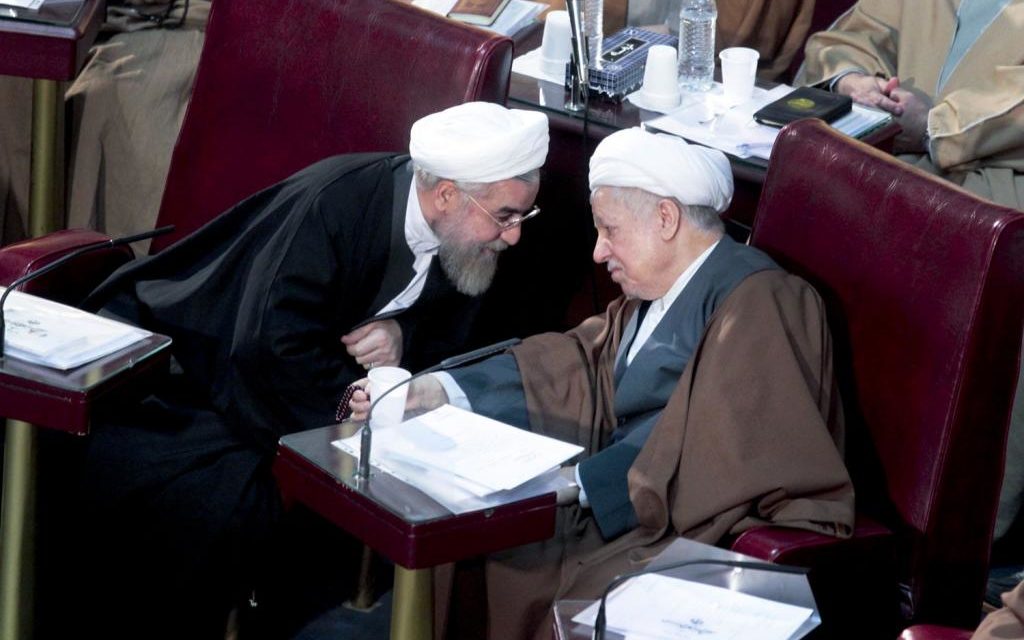PHOTO: President Rouhani and former President Rafsanjani
On Saturday, EA’s Ben Offiler wrote of differences within the Iranian regime over the approach to Syria, with the “defiance” of the Revolutionary Guards, Speaker of Parliament Ali Larijani, and even Foreign Minister Mohammad Javad Zarif contrasting with the “prudence” espoused by President Rouhani.
However, those differences were cordial. While Rouhani did not blame Syrian insurgents for the chemical weapons attacks of August 21 or focus on a US-Saudi-Israeli plot to overthrow President Assad, he did not challenge those who did.
All this changed over the weekend, thanks to former President Hashemi Rafsanjani.
Rafsanjani, who has been Rouhani’s political mentor, told a meeting of officials in northern Tehran last Thursday, “The people have been the target of chemical attacks by their own government and now they must also wait for an attack by foreigners.”
And there was more, with the former President implying that the Assad regime was also responsible for mass detentions and many of those killed since March 2011: “The people of Syria have seen much damage in these two years, the prisons are overflowing and they’ve converted stadiums into prisons, more than 100,000 people killed and millions displaced show the plight of Syria more than ever before.”
Rafsanjani’s comments were initially repeated by Naeimeh Eshraghi, the granddaughter of Ayatollah Khomeini, on Facebook and by some local news sites. However, they only really took off publicly on Sunday when the Iranian Labor News Agency dared to print them.
ILNA soon pulled back, removing the blame on the Assad regime for chemical weapons by deleting the words “by their own government”. However, it did not withdraw Rafsanjani’s remarks about detentions, deaths, and refugees.
An official of the Expediency Council, headed by Rafsanjani, said it was a “rumor” that his boss had criticized the Syrian regime, but the former President had made his point.
An EA correspondent with extensive sources in Iran explains:
The amount of direct testimonies on the original wording — and my own experience in attending at least two events in which Rafsanjani said something in public but then quickly had his media people ask all news agencies (including foreign ones) to rectify — suggests that the original was indeed uttered by him.
Moreover, there are ripples elsewhere. Foreign Minister Zarif, while putting out the warnings against US intervention and condemning the insurgency, also admitted that Damascus had committed “great errors” in its handling of the conflict.
So what is happening within the regime? Does Rafsanjani’s intervention herald a dispute moving from polite divergence to pointed differences over the handling of Syria?
From the start of his Presidency, Hassan Rouhani has not been comfortable with the hard-line propaganda from elements like the Revolutionary Guards, with all blame placed on a Syrian opposition directed by malevolent foreign actors. In July, while waiting to take office, Rouhani said:
We should not describe as oppressive brutal actions in an enemy country while refraining from calling the same actions oppressive if they take place in a friendly country. Brutality must be called brutality.
The aggressive Iranian line also threatens Rouhani’s foreign policy of “engagement”, not just because it targets the US but even more because it stokes confrontation with Gulf States, especially Saudi Arabia.
However, Rouhani, a pragmatic politician, realises that he cannot start an open dispute with the Guards and perhaps the Supreme Leader. So as President, his comments have been measured, avoiding any focus on the “brutality” of the Assad regime.
This accommodation might have continued had it not been for the chemical weapons attacks near Damascus that killed at least 1,360 people. Despite the rhetoric from Tehran, Rouhani and Rafsanjani realised from the start that the Syrian military had carried out the mass killing as part of an offensive to clear insurgents from the capital’s suburbs.
Both men in interviews, on websites, and on Twitter focused on the atrocity of chemical weapons, drawing on the suffering of Iranians at the hands of Iraqi warfare in the 1980s. They called for full United Nations inspection of the sites of the attacks.
But should they go farther, with the Assad regime limiting the inspections and with the threat of a US-led military intervention?
Rouhani could not risk doing so because of his position. Rafsanjani, denied the Presidency this spring when he was disqualified from candidacy by the Guardian Council, could.
Meanwhile, the Revolutionary Guards, through outlets such as Fars News, have ramped up their denunciations of the insurgents, the US, and Israel. In the last 48 hours, they have focused on Saudi Arabia — the primary supplier of arms to the Syrian insurgency — accusing head of intelligence Prince Bandar of masterminding the plot to overthrow President Assad.
The EA correspondent sets the changing political scene:
Iran’s position on Syria is starting to crack, with dissent and contrarian voices on Assad’s conduct growing by the day.
But it is being effectively placed next to hard-line positions, especially from within the Revolutionary Guards, who appear to be steadfast on the old “Assad till the end” line.
Where Ayatollah Khamenei stands in all of this is anyone’s guess, but I think that Rafsanjani somewhat tried to force the Leader’s hand with his comments on Assad’s responsibility in the chemical attacks.

